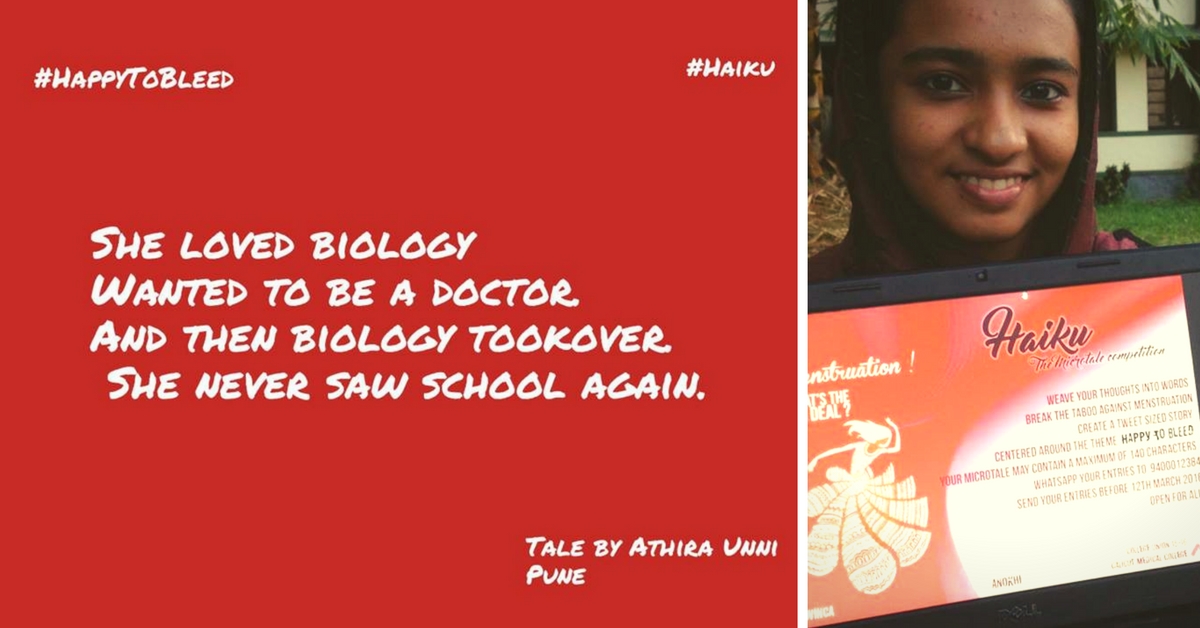Inspired by the Happy to Bleed campaign that urged women to pose for the camera with their sanitary napkins, a bunch of students from Calicut Medical College, Kozhikode, got together to write haikus to end period shaming.
If you are a woman who grew up in India, you know what period shaming means. One fine day you suddenly realise that your period is a couple of days early, you whisper to your friend and ask for a sanitary napkin, which you then hide among the folds of your clothes while simultaneously checking your pant/skirt for red stains.

This drill has been ingrained in our heads as the appropriate thing to do because any positive acknowledgement of the menstrual cycle is looked upon as deviant behaviour.
According to The Huffington Post, the idea of the campaign came during one of the student meetings regarding the college magazine where an intern dared the students to walk in the college grounds with an uncovered sanitary pad packet. Some of us, who have observed and learnt from the hurried stuffing of sanitary napkin packets into black plastic bags at local pharmacy stores, know that the act of openly acknowledging periods is a move that is traditionally frowned upon.
No one came forward for the dare. But they found it amusing how women have been forced to suppress the reality of a natural, biological function.
It was then that James Paul, a third year MBBS student came up with the idea of conducting a haiku/micro-tale contest a couple of months before the International Women’s Day in order to urge students to erase the stigma around menstruation.
Paul has participated in other events around gender rights before. “He felt it was not right to limit the freedom of women just because they have periods. This he realised after having come across many instances of period shaming during his school days,” said Sreya Salim, editor of the college magazine.
Once the posters were put out, the team was flooded with various haikus addressing the hypocrisy around periods — some spoke about the perceived “impurity” of a woman on her period, some spoke about the burdens of “womanhood,” and some even addressed the fact that men shouldn’t be squeamish about periods because they wouldn’t have been born if women didn’t have periods.
With its burgeoning popularity on social media, the contest received entries from all over the country and some even from France.
After the five winners were announced, the team decided to print a book which compiles the haikus as a record of the defiant and courageous behaviour of students, who are keen on sensitizing the society about gender-related issues.
Nikita Azad, who started the ‘Happy to Bleed’ campaign as a retaliation against authorities in Sabarimala claiming that they will install special machines to bar women who are menstruating from entering temples, also reached out to support the haiku campaign.
All pictures: The Red Cycle/Facebook
Know more about Happy to Bleed here.
Like this story? Or have something to share? Write to us: contact@thebetterindia.com, or connect with us on Facebook and Twitter (@thebetterindia).
If you found our stories insightful, informative, or even just enjoyable, we invite you to consider making a voluntary payment to support the work we do at The Better India. Your contribution helps us continue producing quality content that educates, inspires, and drives positive change.
Choose one of the payment options below for your contribution-
By paying for the stories you value, you directly contribute to sustaining our efforts focused on making a difference in the world. Together, let's ensure that impactful stories continue to be told and shared, enriching lives and communities alike.
Thank you for your support. Here are some frequently asked questions you might find helpful to know why you are contributing?

